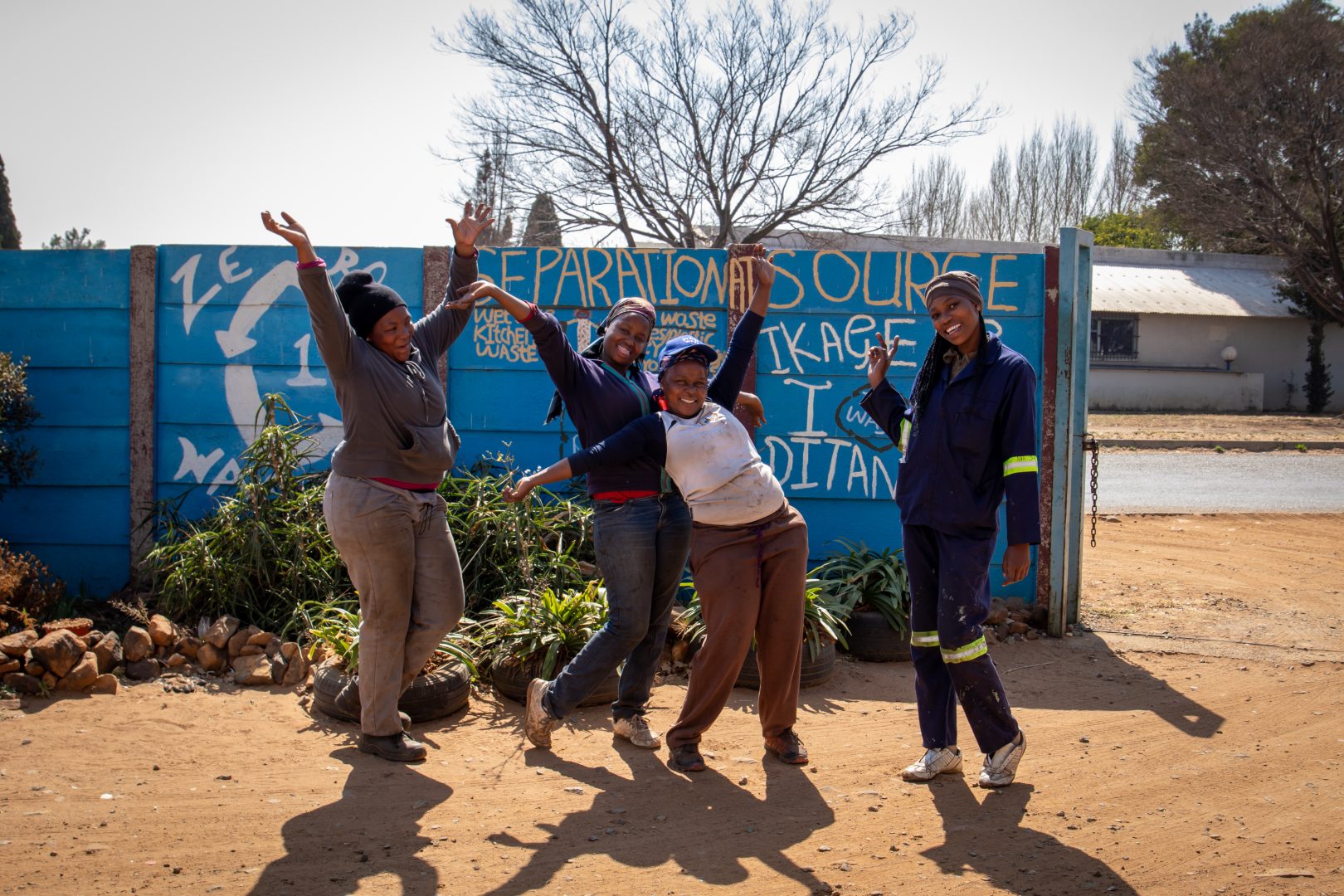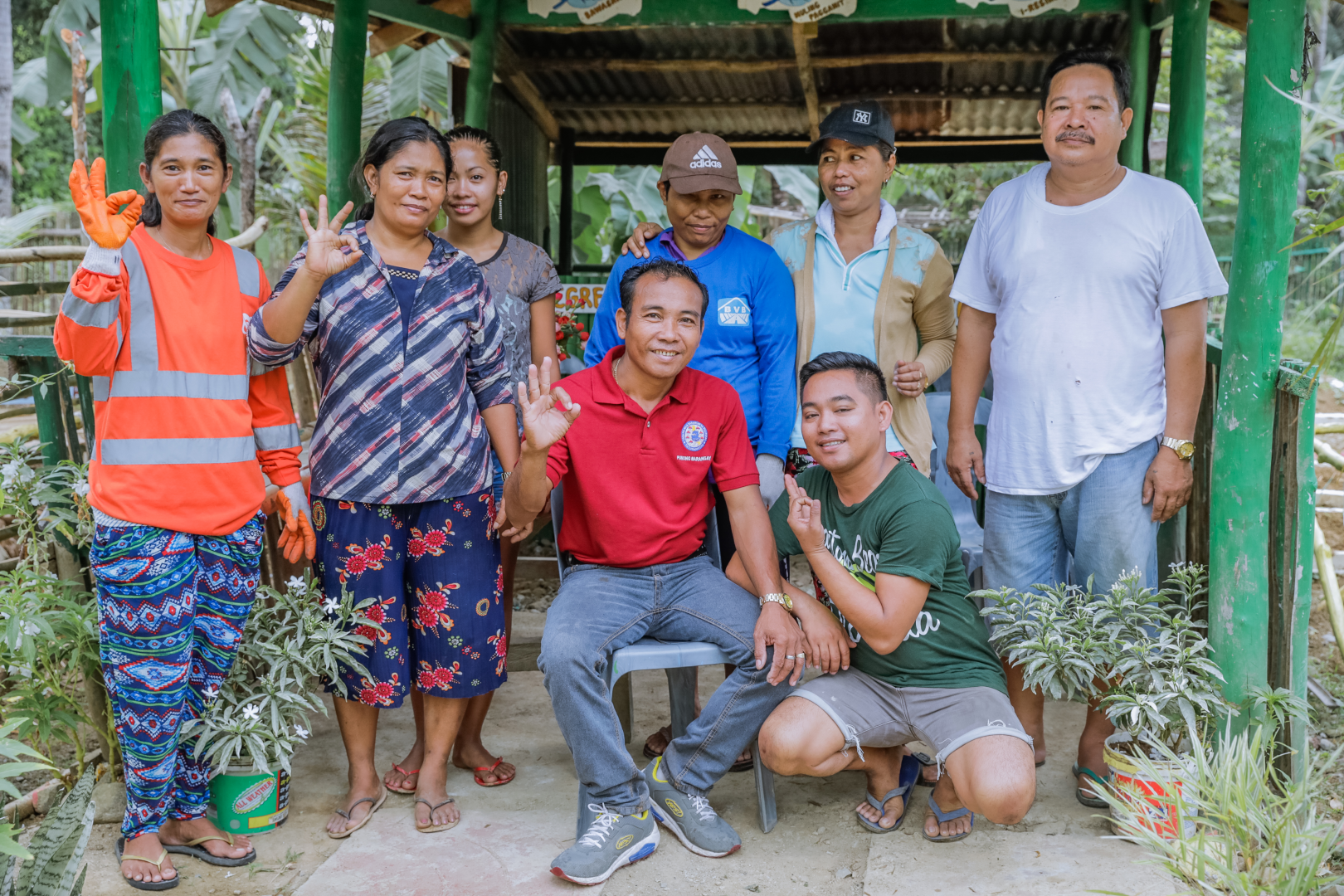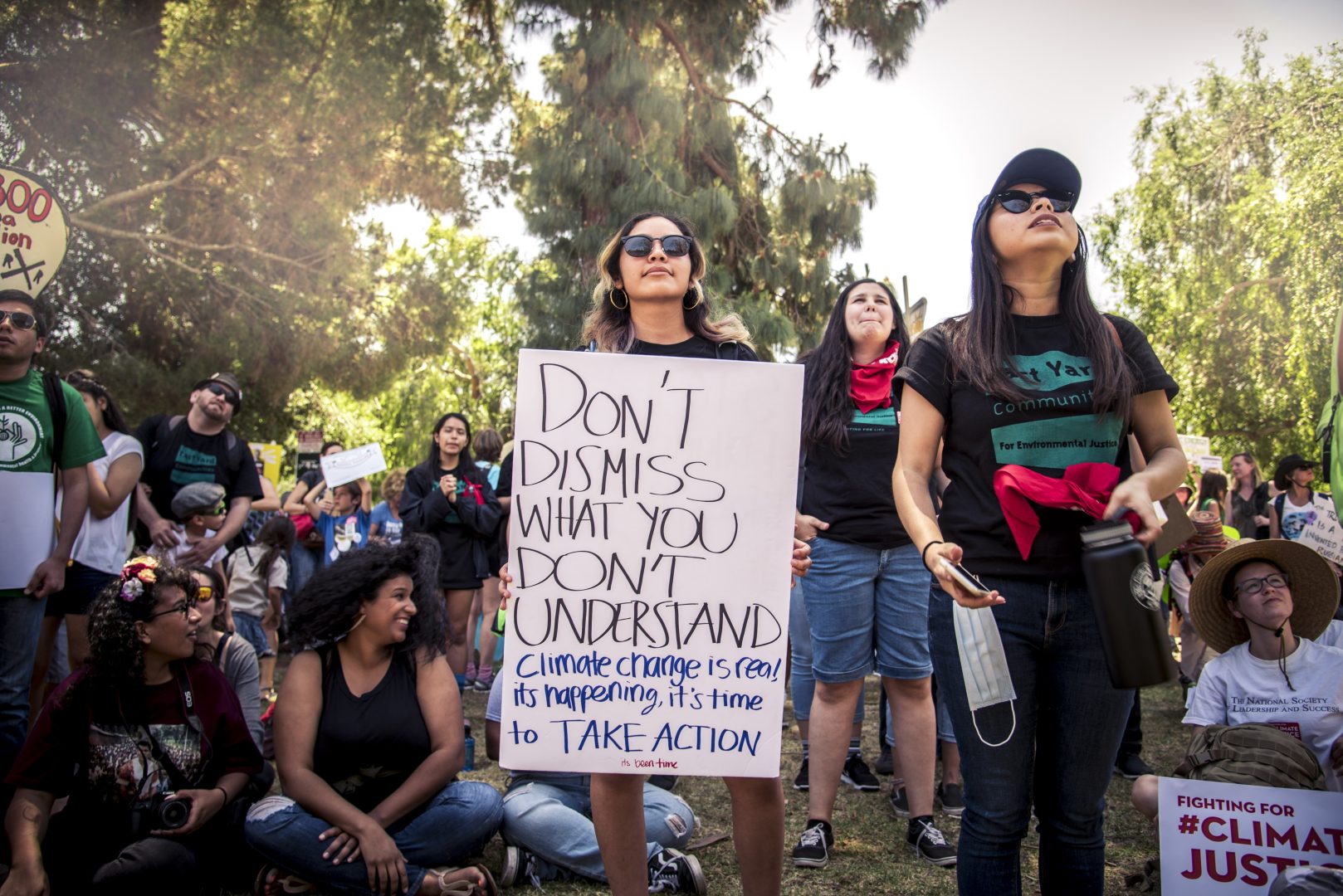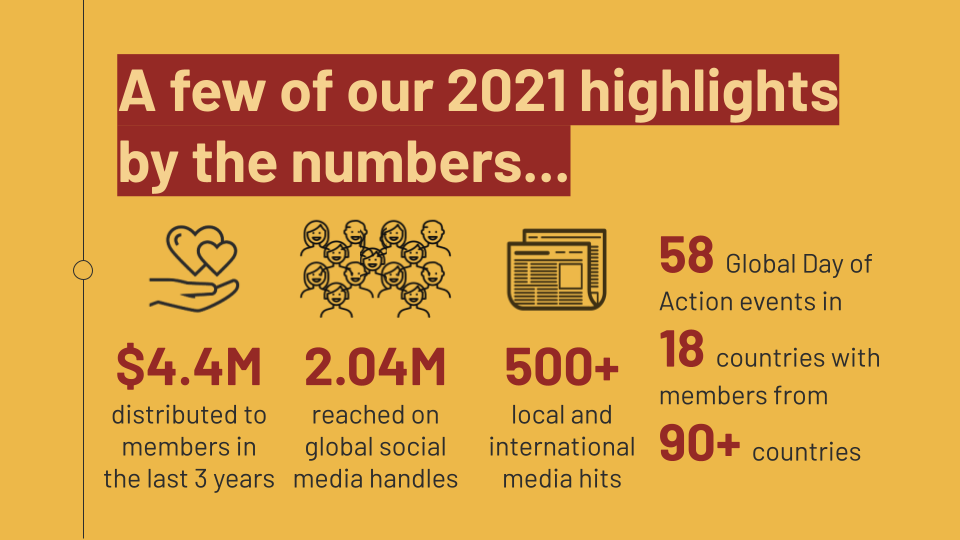Our members have confronted multiple threats to their communities and organizing efforts in the past year, including COVID-19, local climate emergencies, economic downturns, and many of the other important environmental and justice issues of our time. Despite these significant odds, members took collective action to put people-powered solutions at the forefront, demonstrating the power of solidarity in practice! We celebrate the strength of the movement, and all that we’ve accomplished together over this challenging year.
Africa
Increasing plastic waste pollution, the threat of waste colonialism and false solutions to the environmental crisis are some of the challenges faced in Africa. To address this, GAIA Africa created awareness on these issues by working with members championing zero waste work to develop publications and educational videos to mobilize and impact the work of allied and grassroots movements.
On the 22nd of April, a case study on Rwanda’s plastic bans was launched. Rwanda has demonstrated that plastic pollution reduction is possible through strict bans on single-use plastic. To commemorate Africa Day on the 25th of May, GAIA, together with 15 member

and ally organisations from Africa, participated in a mobilisation video to call for all countries to take responsibility for how they produce and manage their waste. In light of World Cities Day, 31st of October, GAIA developed a video series on the benefits of waste pickers organizing themselves into cooperative and democratic associations. On the 3rd of December, GAIA launched the publication, ‘Strengthening Waste Picker Organising in Africa.’ The publication reflects the experiences of waste pickers in South Africa, Ghana, Kenya, Tanzania, Morocco and Zambia, and showcases the need for building representative waste picker organizations.
- Two new case studies on plastic pollution and waste picker organising;
- One mobilization video to call for all countries to take responsibility for producing and managing their waste, featuring 15 member and ally organizations from Africa.
- One four-part video series on the benefits of waste pickers organizing themselves into cooperative and democratic associations.
- Twenty-six member groups from 14 countries were given small to medium-sized grants for different activities, including wellness funds, tech grants, relief and advocacy grants and funds towards initiating projects that advance zero waste, plastic reduction and movement building.
Asia Pacific
Despite the pandemic and the transition to online activities, GAIA Asia Pacific (AP) continued to work on reducing plastic waste and instituting Zero Waste models in 20 cities. This was achieved through the International Zero Waste Cities Conference, a space for knowledge-sharing and collaboration among stakeholders and the Zero Waste Academy, an online course, co-implemented by GAIA AP and Mother Earth Foundation which further produced 36 individuals championing zero waste.
In June and October, through our partnership with the Non-Governmental Organization (NGO) Forum on the Asian Development Bank (ADB), GAIA has continued to push for divestment from

waste-to-energy incineration through direct dialogue with bank officials, media briefings, and a social media push. We proposed new language to be included in the ADB’s new Energy and Safeguard Policy. GAIA AP showcased the successes of our members in implementing single-use plastic bans in their communities while also stressing the dangers of plastic toxicity.
- 22 New Members Welcomed
- 2 media fellowships conducted, 22 new media fellows produced
- 1 four-month long communications officers fellowship for the Comms Group
- 6 new publications were produced
Europe
Throughout 2021 and the ups and downs of the pandemic that we all still face, Zero Waste Europe managed to grow its network, and increase its impact in the pursuit of a waste-free world.
We have managed to improve European waste legislation from product design to waste disposal, including restricting EU waste exports to the rest of the world. We have created the Mission Zero Academy and started operating the Zero Waste City certification with great success and today we have groups in 13 European countries working with hundreds of municipalities. You can learn about all this progress in our new State of ZW Municipalities Report.

We are also making great progress in the field of prevention and reuse of packaging as well as hygiene items and with our members we champion the solutions work in the continent.
Because of the pandemic we have had to celebrate our 2 annual meetings online and through them and the many webinars and skillshares we have managed to keep the feeling of collective support and solidarity alive in the movement.
- 455 cities in the Zero Waste Cities Network
- 33 new publications on the Zero Waste Europe website
- 1,350 press/media mentions
- 1 State of the Zero Waste Municipalities Report 2021
- Countless owned and joint campaigns on reuse, waste trade, food contact materials, anti-incineration, circular menstrual products and nappies, and chemical recycling.
Latin America & The Caribbean
This year we continued to face the pandemic in our region, but also the usual conflicts such as environmental problems and political instability. But resilience is one of the most important characteristics of our people and especially of our members, who we were able to help through emergency and welfare funds.
Thanks to the tireless work of our members and their national alliances we were able to continue to collaborate on publications, promote

the work of waste pickers, increase our media presence, and something we do very well in Latin America – talk about our causes and share reflections on justice for nature and communities.
We joined forces to address new threats such as waste colonialism through plastic waste trade and we reinforced our commitment that incineration will never be a solution to the waste crisis, and that solutions such as waste pickers inclusion is a feasible one that already exists in our region.
- First case study on an incineration project on an island and on the only incinerator built in Latin America. San Andrés, Colombia: 10 years of an unused incinerator and an island overflowing with waste. And 3 case studies on zero waste: Santa Juana, Chile, Londrina and Araraquara, Brazil.
- Waste trade campaign:
-
- 3 week social media campaign to give a comprehensive picture of the issue at stake.
-
- 8 press hits including a front page in a Mexican newspaper that has more than 2 million followers on facebook.
- 2 publications: Plastic waste has arrived in Latin America: Trends and challenges in the region / Plastic Waste Imports in Ecuador.
- Funds distributed to our members to be used in wellness, advocacy and recovery.
- We held our regional meeting with a large number of participants. We shared our stories as environmental activists. We hope to meet again in person soon!
United States & Canada
With the US and Canada being majorly responsible for the waste and plastics crisis, our region continued our work in 2021 to curb overproduction and stop waste pollution. As our members continue organizing against waste burning, they’re also leading their communities toward a just transition to zero waste with community organics management. Breathe Free Detroit, Minnesota Environmental Justice Table, and South Baltimore Community Land Trust all undertook pilot programs in 2021 to grow their local composting ecosystem.

In the federal domestic policy space, our staff and movement submitted comments to the Environmental Protection Agency urging regulators to classify pyrolysis and gasification as incineration. GAIA also provided legislative testimony, trainings, and research on plastic incineration in several states. And with just a few weeks left in 2021, we released an anti-incineration organizing toolkit to support communities in their campaigns for the years ahead.
- 40 press hits, with 10 featuring members
- 4 Anatomy of a Zero Waste webinars
- 1 new report
A Global Network

In the beginning of the year as the pandemic raged on across the globe, it became increasingly clear that we cannot go back to normal. To inform cities and municipalities around the world looking for better ways to rebuild, GAIA launched a publications series called, Beyond Recovery, detailing how zero waste systems can help cities be resilient, create more and better jobs, and foster a healthy environment for families and communities. We also organized a Global Day of Action, where members staged events in 18 countries calling for a just recovery from COVID-19 through zero waste.
Later in the year, GAIA members were out in force at COP26 with a clear message: to solve the climate crisis, we must solve the waste crisis. We shared our knowledge and perspectives in panel discussions both inside the COP and at the People’s Summit, and staged an action calling out the hypocrisy of Unilever’s sponsorship of the COP. GAIA has also continued to expose the truth behind the industry hype around “chemical recycling,” releasing a video with the Changing Markets Foundation. Last but not least, we were delighted to launch a brand new website with a sleek design and easier access to our resources.





























